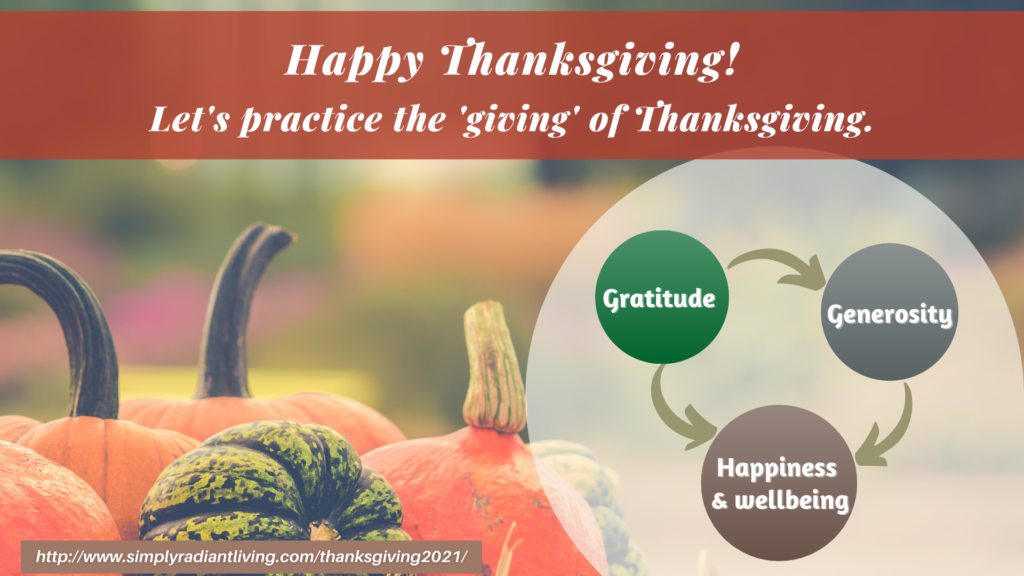Join our mailing list to receive the latest health tips and updates.
You have Successfully Subscribed!
Let’s Practice the ‘Giving’ of Thanksgiving

Happy Thanksgiving! (to those living in the United States)
Thanksgiving is a great time to remind ourselves to appreciate and be grateful for what we already have, what we have been given, and all the goods that happen to and around us, including little things in life.
The practice of gratitude not only is beneficial for our mental health by reducing stress and increasing the sense of well-being, but it is also beneficial to our physical health including reducing inflammation in the body, improving sleep etc. (For more details on what scientific research has shown, please check out my previous article “Why You Should Embrace Gratitude Practice”.)
Besides gratitude practice, there is also another aspect of Thanksgiving that we may often overlook, i.e., the practice of ‘giving’.
In fact, scientific studies have shown that the feeling of gratitude can trigger physiological and behavioral response in a person that would promote the act of generosity.1
Therefore, gratitude and generosity (or giving) pretty much go hand in hand.
It has long been observed socially and culturally, and also has been shown more recently by scientific studies (including brain imaging) that the act of generosity can lead to increased level of happiness.2
Overall, the practice of generosity is associated with improved mental health and well-being such as increased subjective sense of well-being, feeling of vitality, self-esteem, and life satisfaction, and purpose in life.3–6
Giving or generosity is not just about offering material goods, but also includes non-material offerings, such as our time, effort, service, patience, listening, kindness, compassion, respect, understanding, love, etc. to others.
Ideally, true giving/generosity or altruism should be purely for the benefits of others, without expecting anything in return.
It should be noted that sometimes what we think is good for another person may not be appropriate or what the person needs at the time or situation. Therefore, it is important to practice mindfulness during the act of generosity.
Let’s consider practicing generosity during this Thanksgiving and holiday season!
Related Articles
Why You Should Embrace Gratitude Practice
References
- Yost-Dubrow R, Dunham Y. Evidence for a relationship between trait gratitude and prosocial behaviour. Cogn Emot. 2018;32(2):397-403. doi:10.1080/02699931.2017.1289153
- Park SQ, Kahnt T, Dogan A, Strang S, Fehr E, Tobler PN. A neural link between generosity and happiness. Nat Commun. 2017;8:15964. Published 2017 Jul 11. doi:10.1038/ncomms15964
- Kahana E, Bhatta T, Lovegreen LD, Kahana B, Midlarsky E. Altruism, helping, and volunteering: pathways to well-being in late life. J Aging Health. 2013;25(1):159-187. doi:10.1177/0898264312469665
- Nelson SK, Della Porta MD, Bao KJ, Lee HC, Choi I, Lyubomirsky S. ‘It’s up to you’: Experimentally manipulated autonomy support for prosocial behavior improves well-being in two cultures over six weeks. The Journal of Positive Psychology. 2015;10(5): 463-476. doi:10.1080/17439760.2014.983959
- Xi J, Lee M, LeSuer W et al.Altruism and existential well-being. Applied Research Quality Life. 2017;12:67–88. doi:10.1007/s11482-016-9453-z
- Pareek S, Jain M. Subjective well-being in relation to altruism and forgiveness among school going adolescents. International Journal of Psychology and Behavioral Sciences. 2012;2(5):138-141. doi:10.5923/j.ijpbs.20120205.02
